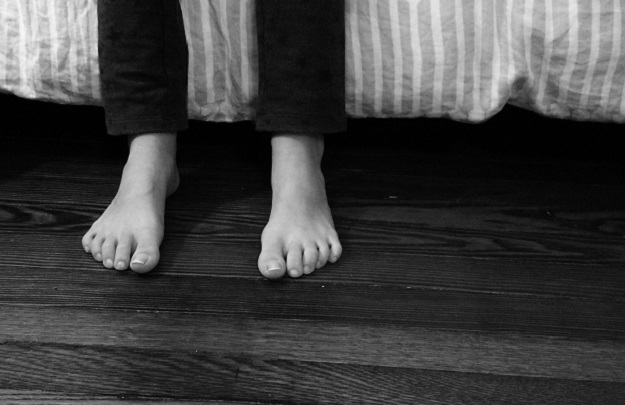
Gratitude has been marketed to death as a means to an end.
If you want to be happier, live longer, be more productive at work, have better relationships, make it through a difficult season—all you have to do is be grateful. Buy a cute “gratitude journal”—even though any journal or book will actually do the trick—and start writing.
The underbelly of gratitude, which isn’t talked about as much, is bitterness. Is it possible to be content, even grateful, not solely for the things that we do have in our lives, but for the things that irritate us, the things that we’ve lost, or the things that never arrived?
When I was 34 years old and my daughter was only 21 months, my husband died suddenly. I was subjected to the usual well-meaning platitudes: “You’re lucky to have ever had that kind of love;” “At least you’ll always have those beautiful memories;” and “Aren’t you glad that you had him at all, even for just those 11 years?”
None of these statements made me feel better. In fact, they stung. They affirmed that I’d had something truly special, and now it was gone. Yes, I’ve learned to smile at my memories or chuckle as I tell our daughter, now nine years old, stories about her dad, but in the face of immediate loss, the memories we no longer shared were solely painful.
“There is no greater sorrow than to recall happiness in times of misery,” wrote the famous poet Dante.
Loss changed my perspective forever, but it didn’t instantly make me grateful for the life I had lost or the life that was left. I am often reminded of this quote from author Rhoda Janzen:
“I had assumed that altered circumstances meant altered lives. I had assumed that because the external circumstances of my life were so radically different, I must be radically different. But change doesn’t work like that. Altered circumstances give us only the opportunity to change. We actually have to do the work.”
My gratitude for the life I had, for the husband that loved me, and for the life that remains, has taken years to mature.
It began with small things. I can remember vividly the first meal—a sandwich a friend made me—that tasted delicious. Or what it felt like the first time I was able to watch an old episode of “Arrested Development” and chuckle. Even when my grief was still raw, there were moments of contentment that later blossomed into gratitude.
When I was pregnant, I downloaded meditations for labor. One of them had me go through every part of my body that wasn’t in pain in order to take attention away from the contractions. “My shoulders are fine. My shoulders are fine. My shoulders…are…fine,”—I’d repeat this to myself with each body part. I ended up using this during my 26-hour labor, and it helped. The mantra didn’t mask or repress the pain, it just took my awareness someplace else that didn’t hurt as much for a little while. It provided a necessary reprieve.
Joan Didion drove this idea home in a piece called In Bed. She spends most of it describing the torture of her regular migraines, but in the final paragraph, she explains what happens directly following a migraine. Anyone who has ever had a migraine—or felt intense pain—can understand what she is talking about:
“Then the pain comes, and I concentrate only on that. Right there is the usefulness of migraine, there in that imposed yoga, the concentration on the pain. For when the pain recedes, ten or twelve hours later, everything goes with it, all the hidden resentments, all the vain anxieties. The migraine has acted as a circuit breaker, and the fuses have emerged intact. There is a pleasant convalescent euphoria. I open the windows and feel the air, eat gratefully, sleep well. I notice the particular nature of a flower in a glass on the stair landing. I count my blessings.”
I was able to maintain the concentration on my own pain for a long time, but when my raw grief finally receded, I too found I could “feel the air, eat gratefully, sleep well.” I too noticed “the particular nature of a flower in a glass on the stair landing.” And yes, I counted my blessings. This is not to say I live now in the “convalescent euphoria” Didion speaks of. I have normal, difficult days. I feel depressed or anxious sometimes too, but when I pick up my own gratitude journal against the backdrop of a difficult week, the lens of gratitude adjusts back to that microscopic level.
I don’t write down things that I possess or wishes fulfilled. The smallest details are a means to contentment and become souvenirs of self-care. They can be a way to connect body, soul, and mind: a particularly beautiful cloud, a chipmunk that chirps outside my daughter’s room every morning sitting on the same low branch of a bush, the sound of my daughter’s voice reading aloud at night.
These moments of gratitude aren’t tacked on—they are inborn.
My daughter and I also continue a tradition of keeping a gratitude basket where we write down things we’re grateful for during the month of November and then read them out loud for the first time on Thanksgiving. I confess, I sneak peeks of her notes on days when I need a little lift. The other day I read a few: “I’m thankful for the person who invented slippers.” “I’m thankful that I’m able to dance.” “I’m thankful for lying in bed.” Small things.
“Snoring is the sweetest music in the world. Ask any widow,” writes Elisabeth Elliot, and I know this to be true. The same quirks that we initially fall in love with in people can eventually become grating in the day to day life we share. Somewhat cruelly though, loss returns them to their rightful place. Suddenly, because they are no longer there, we long to hear them or see them.
If I am tempted to feel nostalgic that my daughter is growing up too quickly, I think of the families of the Sandy Hook children who would give anything to experience the bittersweet feeling of watching a child grow up. When my daughter is humming and twirling around the kitchen as I prepare dinner and I am about to tell her to be quiet, I stop what I’m doing and watch her for a moment. The irritation dissipates. She is suddenly lovely.
The philosopher Arthur Schopenhauer wrote that, “Mostly it is loss which teaches us about the worth of things.” Certainly, my own experience with loss has changed my perspective on the worth of small, often unnoticed things, and even on the worth of things that I had previously labelled irritations. But I don’t think it has to be this way. I don’t think the only path to this kind of gratitude is loss.
Loss is really the underside of love. But what if love was our first teacher? We wouldn’t have to get to the underside of it to know the worth of things.
“Love has a keen eye and fixes on particulars: a laugh, a tendril of hair, a ray of light across the horizon, a sharp-edged memory. Generalities are for philosophers—the heart knows details,” wrote Rabbi Wolpe. Love also has this ability to notice, to zoom in on a microscopic level, to transform gratitude lists from exercises in measuring happiness to the natural outgrowth of a heart that risks loving and living in a world where it is vulnerable.
The final question that I have been pondering about gratitude is: Can I be grateful for something I no longer have, something that I’ve lost? And moreover, can we stave off bitterness and be grateful for the things that we don’t have at all, the things that we may desire deeply, things that other people have, but for whatever reason, have not come to fruition in our own lives?
As he often does, the writer George MacDonald turned any earlier notion of gratitude I had on its head in just a few sentences:
“Let me, if I may, be ever welcomed to my room in winter by a glowing hearth, in summer by a vase of flowers; if I may not, let me think how nice they would be, and bury myself in my work. I do not think that the road to contentment lies in despising what we have not got. Let us acknowledge all good, all delight that the world holds, and be content without it.”
MacDonald doesn’t just take the microscopic view of gratitude—he takes the telescopic view. He looks at the whole of life as an astronomer would look out at the universe in wonder. He doesn’t need to possess the things he sees others having. He only needs to acknowledge the grandeur of the world and the fact that he gets to be a part of it at all. It connects rather than disconnects, shares rather than hoards, and allows us to genuinely celebrate the gifts we see others receiving. And yes, it allows us to be truly grateful for things that we have experienced, even if we no longer possess them.
This is mature gratitude.
Last year, I took part in an online course on creating good habits. One of the habits suggested was saying the mantra, “Today’s going to be a great day” each morning when you get out of bed and your feet hit the floor. I wasn’t sure why, but I just couldn’t get on board with the idea. After all, it might be a terrible day.
But what was important about the mantra is the same thing that gratitude journals are really getting at: perspective. How can we enter each day with the perspective of Didion’s flower in a glass on the stair landing? Or with the keen eye of love that Rabbi Wolpe talks about? Or acknowledging what MacDonald deems “all delight that the world holds” and being content with, or without them?
It took some time to arrive, but my own mantra when I pull back the covers begrudgingly on cold winter mornings, when I remember it, has become four simple words: “Today is a gift.”
~
~
Author: Julia Cho
Image: Audrey Cho
Editor: Nicole Cameron
Copy Editor: Catherine Monkman
Social Editor: Catherine Monkman











Read 6 comments and reply